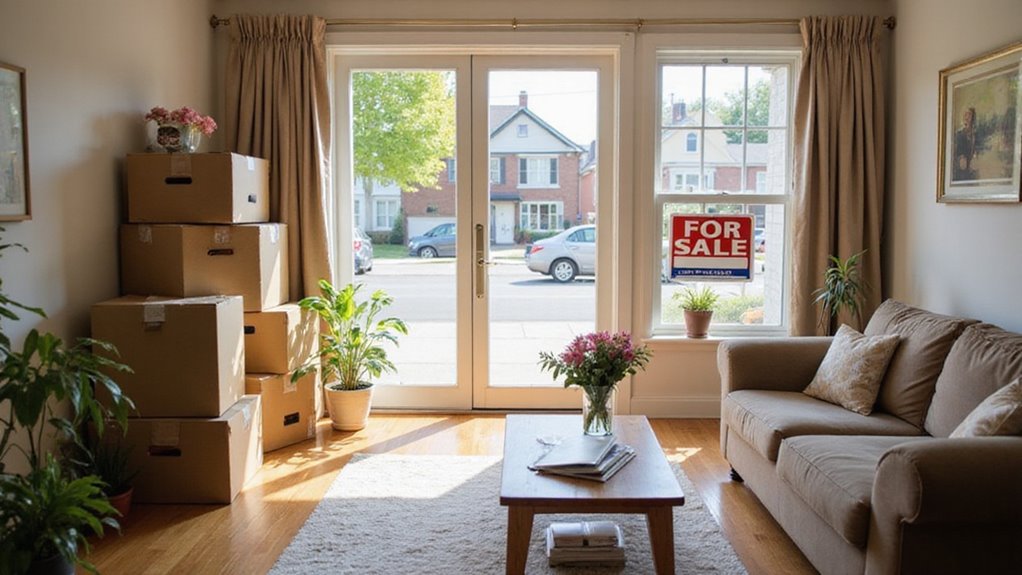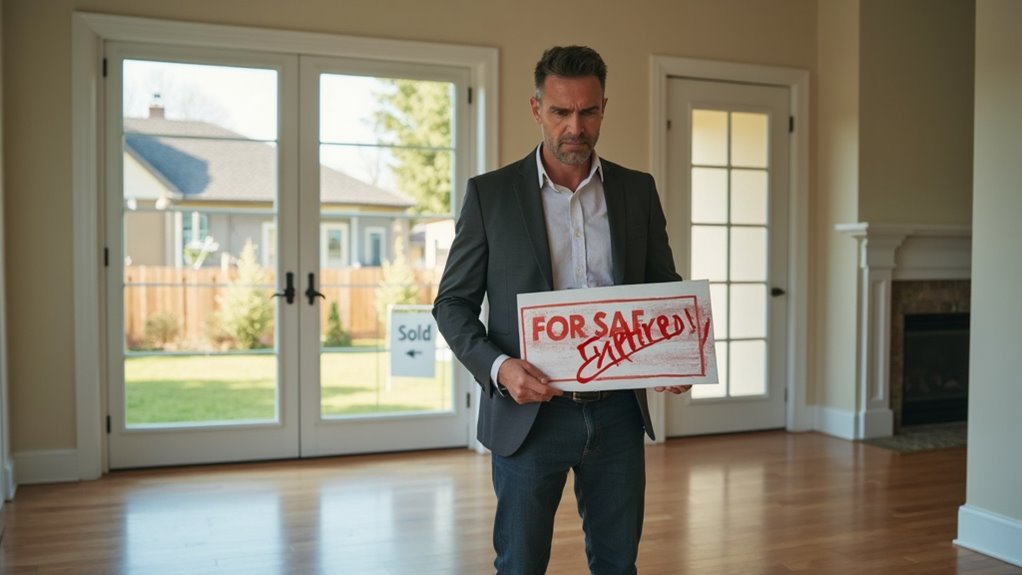When your home listing expires without selling, it can be frustrating and confusing. Many homeowners wonder if the price is the problem. You might worry you missed your chance to attract buyers.
This uncertainty can make you feel stuck. You may feel pressure to lower your price without knowing if it will help. If you cut the price too soon, you risk losing money.
You should often lower the price after an expired listing, but only after careful market review. Look at feedback and recent sales to guide your decision. A smart price change can draw buyers and secure a sale. This blog will guide you through the right steps to decide about lowering your price and getting your home sold.
Key Takeaways
- Lowering the price after an expired listing can renew buyer interest and increase showings, especially if overpricing was the main issue.
- Compare your home to recent sales and current listings to determine if your original price was above market value.
- Extended market time at a high price can make buyers suspicious, so a price reduction may help reposition your property effectively.
- Gather feedback from agents and buyers to assess if price was the major barrier before deciding to reduce it.
- Relisting at a more competitive price during a peak season increases your chances of attracting offers and selling faster.
Understanding Why Listings Expire

A listing expires when the property does not sell within the set time. This usually means no qualified buyer made an offer. Several reasons can cause this to happen.
One main reason is pricing the home too high for the market. Buyers often avoid homes that cost more than similar listings. If the price does not match buyer expectations, fewer people will schedule showings. Sellers should also consider how accurate pricing based on recent sales and property condition can impact buyer interest.
Marketing also plays a big role in attracting buyers. Poor marketing means fewer people know the home is for sale. If buyers never see the listing, they will not make offers.
If a home stays on the market too long, buyers may think something is wrong. This can further reduce interest. Reviewing recent sales and market trends can help set a better price next time.
Before relisting, it’s also important to consider whether legal documents required for selling are in order, especially if there are unique ownership circumstances.
Common Reasons Homes Don’t Sell
If your home didn’t sell, you’re likely facing issues with pricing, marketing, or property condition. Statistics show that overpriced listings linger on the market while ineffective marketing and poor presentation turn buyers away. Another common reason homes remain unsold is termite damage, which can significantly weaken the structure and deter potential buyers.
To reposition your property for success, you need to address these barriers strategically. Before relisting, it’s also wise to conduct a thorough property lien search to ensure there are no hidden legal or financial obstacles that could further deter buyers.
Overpriced Listing Strategy
Overpricing your home makes it hard to sell. Homes with high prices usually stay on the market longer than others. Buyers often skip listings they think are too expensive.
If a house sits on the market too long, it may get a bad reputation. This can lead to even lower offers later. Sellers who wait for a better price often end up disappointed.
If you want to sell quickly, use recent sales data to set your price. Market trends can help you choose a fair number. Accurate pricing attracts serious buyers right away.
Ineffective Home Marketing
Ineffective home marketing makes it hard to attract buyers. Most buyers start their search online, so your listing must stand out. If your photos, descriptions, or online presence are lacking, your chances drop quickly.
Professional photos and clear details help homes sell faster. Homes with high-quality images sell about 32% faster and for more money. If you use poor images, you may miss out on offers.
Effective marketing uses social media ads, virtual tours, and open houses. These tools create more interest and urgency among buyers. A strong marketing plan gives your home more attention in the market.
Pricing also matters when marketing your home. If your price ends in a “9,” buyers are more likely to find it. Even a fairly priced home can be ignored if not marketed well.
Poor Property Condition
Many homes do not sell quickly because they are in poor condition. Even with good marketing, buyers often walk away from neglected homes. Property problems can scare people or lead to low offers.
Some common issues hurt your chances. Worn walls, damaged floors, or old fixtures make a house look tired. Outdated kitchens and bathrooms can turn off buyers who want modern spaces.
Curb appeal is also important. Overgrown lawns or dead plants make a bad first impression. Lingering smells from pets or dampness suggest the home is not well cared for.
If you fix these problems, buyers will notice. A well-maintained home stands out from others. Small improvements can make a big difference in selling your home.
Assessing Your Local Market Conditions
To assess your local market, look at recent sales and current listings near you. Compare your home to similar properties in size and features. Check how long these homes stayed on the market. Reviewing title insurance options can also give insight into potential obstacles that might affect your price or sale timeline.
If homes like yours are selling quickly, your price may be too high. If many homes are sitting unsold, the whole market may be slow. Use this information to see if your price matches what buyers expect.
Neighborhood trends can show if prices are rising or falling. Seasonal changes may affect how many buyers are looking. Adjust your price based on what the data shows, not just your opinion.
If you lower your price, even a small drop can attract new buyers. This change might help your home stand out in searches. Always let facts, not feelings, guide your decision.
You can also employ a professional appraiser to gain an accurate understanding of your property’s market worth before deciding whether to adjust your price.
Evaluating Feedback From Showings

Buyers reveal their true opinions during showings through their actions and comments. Their feedback helps you understand if your home is priced right or has issues. If you analyze these reactions, you can spot problems early.
If buyers leave quickly or rooms stay empty, your home may not attract them. Comments about better nearby homes suggest your price is too high. When buyers ask about days on market, they may doubt your home’s value. Considering the simplified selling process offered by cash buyers can help you avoid some of these pricing and feedback frustrations.
Repeated low offers clearly show buyers think the price is too high. If you see these patterns, consider making changes. Adjust your price or improve your home’s appeal to attract serious buyers.
Carefully evaluating feedback from showings is especially important if you are hoping to unlock equity in home to support your retirement goals.
The Psychology of a Price Reduction
A price reduction changes how buyers see your property. It sends a clear message that your listing now offers better value. This often leads to more attention from buyers. Some sellers are surprised to learn that overpriced homes tend to sit on the market longer, making a price reduction an effective way to re-engage potential buyers.
If you lower your price, buyers may believe the home is a good deal. Research shows small price drops can quickly make a property more appealing. The listing can stand out compared to others.
If a listing did not sell before, a new price may increase showings and offers. Buyers may think the seller is ready to make a deal. This can attract serious and qualified buyers to consider your home.
For sellers who want to move quickly, considering the speed of sale offered by cash buyers can further increase interest and reduce time on the market.
Risks of Pricing Too High

Pricing your home too high can make it hard to sell. Buyers often skip overpriced homes and look elsewhere. This can make your home sit unsold for a long time. Overpricing your home turns buyers away, leaving your property unsold and sitting on the market far longer than you’d like.
A home with a high price may look less appealing than similar homes. Buyers may wonder if something is wrong with it. If this happens, your listing can become stale. Overpricing can also make it difficult to attract reliable cash buyers who have the expertise to handle distressed or hard-to-sell properties.
Agents and buyers might not visit your home if the price is too high. This reduces the number of people who see your property. With fewer showings, your chances of selling go down.
If your home is overpriced, you may only get offers much lower than your asking price. Buyers might think you are desperate to sell. This can lead to tough negotiations.
High prices can also cause problems with appraisals. If the home does not appraise for the asking price, deals can fall through. This could delay or stop the sale altogether.
If you’re selling an inherited property, make sure you verify legal standing before listing, as Florida law may require probate or other legal steps before a sale.
How to Determine If a Price Drop Is Necessary
A price drop may be needed if your home is not selling or getting offers. Review feedback from showings and recent sales in your area. If your price is higher than similar homes, buyers may not consider your listing. Remember that overpriced homes rarely sell quickly and can sit on the market for a long time.
Showing comments about price are a clear sign. Compare how quickly similar homes have sold and at what prices. Watch if homes in your area are spending more time on the market.
If buyers see your home as overpriced, they may ignore it. Lowering your price can show you are willing to work with the market. This action can attract more serious buyers. In some cases, working with cash home buyers can help you sell quickly without needing to lower your price further.
Timing Considerations for Relisting

You need to assess how market downtime affects buyer activity, as relisting too soon can make your property appear stale. Data shows that aligning your relist with peak seasonal demand often yields higher offers and faster sales.
Strategically timing your relist maximizes exposure and ensures your price adjustment has the greatest impact. Consulting local real estate professionals can provide valuable insights into optimal selling months based on your region’s unique market dynamics.
Market Downtime Impact
Market downtime affects your chances of selling after relisting a home. If you relist during slow periods, fewer buyers will see your property. This can lower your chances of a quick and successful sale.
Fewer buyers mean less competition and possibly fewer offers. Your property might stay on the market longer, lowering its appeal. If buyers see a reduced price during downtime, they might think your home is not desirable.
If you relist when the market is slow, you may need to reduce your price again. Longer time on the market can weaken your negotiation power. Smart timing can help you get better results when relisting your property.
Seasonal Relisting Strategies
Seasonal relisting means choosing the best time of year to put your home back on the market. Homes listed in spring and early summer often sell faster and for more money. If you relist during these times, your home will likely get more attention.
You should adjust your price to match the season. A lower price in early spring can attract buyers who are ready to act. If you relist during busy months, your home may appear more valuable.
Avoid relisting in late fall or during holidays if possible. These times have fewer buyers, so your home may sit on the market longer. If you wait for busy seasons, you can increase your chances of selling quickly and at a good price.
Working With a New Real Estate Agent
Working with a new real estate agent can help you sell your home after your listing expires. A new agent brings fresh ideas and updated strategies. You may get better results if you choose someone with local experience.
An experienced agent will check recent sales in your area. If the market has changed, your agent will suggest a new price. This could make your home more appealing to buyers.
A good agent uses pricing psychology to set an attractive price. If your previous price was too high, they will adjust it. If buyers see value, they are more likely to make an offer.
Your agent may shorten the listing time to create urgency. They might use special offers or deadlines to encourage quick decisions. Limited-time promotions can attract serious buyers.
Marketing is important, too. The new agent will likely use better photos and online ads. If your listing reaches more people, your chances of selling improve.
Enhancing Your Home’s Appeal Without Lowering the Price

You can make your home more attractive without lowering the price. Focus on simple upgrades and smart presentation to draw buyers. These steps help your home stand out in the market.
Photos play a big role in attracting buyers. The National Association of Realtors says 83% of buyers rely on pictures when choosing homes to visit. If the listing looks appealing online, more buyers may want to see it in person.
Virtual staging is a cost-effective way to show off empty rooms. Digital furniture lets buyers imagine how the space can look. This can work well if you do not want to spend money on real furniture.
Improving your yard can also help your home sell faster. Homes with professional landscaping can sell for up to 12% more, according to industry research. Simple tasks like adding mulch, trimming bushes, and planting flowers make a big difference.
If you use virtual staging and update your landscaping, your home can seem move-in ready. Buyers may see more value and make stronger offers. You do not have to drop your price to attract attention.
Marketing Strategies to Attract Buyers
Marketing strategies help attract more buyers to your home. If your listing expired, a clear plan can increase interest. Effective marketing can make your property more visible to serious buyers. A strong marketing plan can boost your home’s visibility and attract serious buyers, especially if your listing has expired.
Virtual staging can show buyers how empty rooms might look when furnished. This helps buyers imagine living in the space. If buyers can see the potential, they are more likely to schedule a visit.
Professional photography makes your home look its best online. High-quality photos can help your listing stand out from others. If your home looks appealing in pictures, it may sell faster.
Open houses, both in-person and virtual, bring more people to see your home. These events allow buyers to explore your property easily. If buyers cannot visit in person, virtual tours offer real-time viewing.
Targeted digital advertising can reach buyers who are most likely interested. Social media and real estate websites help share your listing widely. If the right people see your home, you have a better chance of selling quickly.
Weighing the Costs of Keeping Your Home on the Market
Keeping your home on the market costs you both money and opportunities. Each month your house is unsold, you pay for the mortgage, taxes, and maintenance. These expenses add up and reduce your final profit.
If the market changes, your home could lose value or face more competition. Lower prices and more listings can lead to fewer or lower offers. Waiting too long may hurt your bargaining position.
Buyers may see a long-listed home as overpriced or flawed. This perception can make your home less attractive, causing fewer showings. If you want to sell quickly, you may need to rethink your price.
Consider these factors before deciding to keep your price firm. If you are not flexible, you could face more costs and less interest over time. Evaluate your options carefully to avoid unnecessary risks.
Negotiation Tactics After Relisting
When you relist your home, set a strategic anchor price based on recent market data to shape buyer expectations. You should also utilize buyer urgency, as fresh listings often attract more attention in the first two weeks. These tactics position you to negotiate from strength and maximize your sale outcome.
Setting a Strategic Anchor
A strategic anchor means choosing a starting price that guides buyers’ expectations. This price shapes how buyers view your property and what they offer. If you set the right anchor, you keep more control in negotiations.
Anchoring uses pricing psychology to influence what buyers think is fair. The first price buyers see sets their reference point. This can affect all later discussions and offers.
If you want to maximize value, pick your anchor wisely. Set the price just below a round number, like $499,000 instead of $500,000, to make it seem more attractive. Compare your price to similar homes to meet buyer expectations.
If your property has upgrades or unique features, mention them to support your price. Avoid pricing too low, as it may bring in low offers and lower your home’s perceived value. Always use market data and property strengths to set your anchor.
Leveraging Buyer Urgency
To create urgency, set a competitive price when relisting your property. A lower price can attract more buyers quickly. This strategy works best after you have already set a strong price anchor.
Research shows homes with a new price get up to 60% more interest in two weeks. Words like “priced to sell” or “limited opportunity” can make buyers act faster. Clear language helps buyers see value without thinking you are desperate.
You can offer incentives if buyers submit offers within a certain time. Covering closing costs is an example. These steps encourage buyers to act quickly and give you a better position in negotiations.
Setting Realistic Expectations for Your Next Steps
Setting realistic expectations helps you plan your next steps after your listing expires. You need to know what to expect from the market. Clear goals can guide your decisions as you prepare to relist.
You should check recent sales of homes like yours. If your home did not sell, look at what worked for others. This helps you set a price that fits the market.
A lower price does not always mean a quick sale. Buyers notice when a price seems too low. If you set the right price, you may get more attention without looking desperate.
Market timing affects how fast your home sells. You should list your home when buyers are most active. Local trends can show you the best time to put your home back on the market.
Feedback from buyers and agents is important if you relist. You should be ready to make changes based on what you hear. If you adjust your strategy now, you could see better results.
Conclusion
If your listing expired, you should review the market conditions and listen to buyer feedback. If the data supports it, you might consider lowering the price. Making careful changes can help attract new interest and speed up the sale.
If you want to avoid the hassle of relisting, we buy houses for cash. This option can save you time and reduce stress. You do not need to make repairs or deal with showings.
If you are ready for a quick and simple sale, contact Greg Buys Houses. We can provide a fair cash offer and close on your timeline. Let us help you move forward with confidence.

